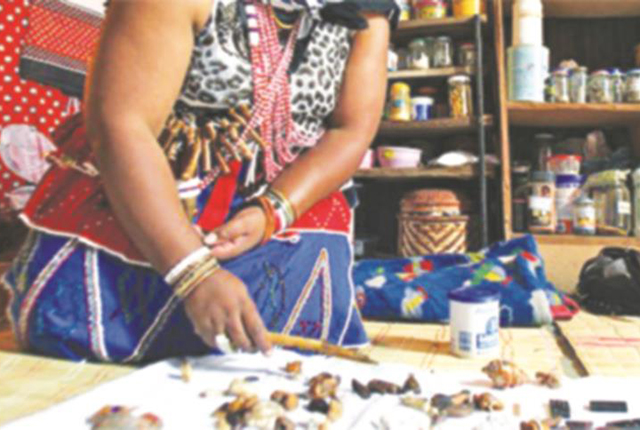The anatomy of a miracle


This sangomas’ divination ritual in some smoky hut somewhere has found its way into the services of ‘men of God’
David Mungoshi Shelling the Nuts0—
In our folklore (ngano/inganekwane) we hear of happenings that cannot possibly be anything other than miracles (minana/izimanga). To understand and fully appreciate this miracle motif we must all become children again and be born again, metaphorically speaking.This is something that is necessary when great strides must be made.
In Matthew 18:2-5 Jesus said: “Truly I say to you, unless you are converted and become like children, you will not enter the kingdom of heaven.” Clearly, it is necessary to be as children and believe in all things so that wonderful things can happen. And I can think of many delightful incidents of wonderful belief exhibited by children.
Sometime after Zambia had become independent and sometime after the Unilateral Declaration of Independence (UDI) by Ian Smith and his Rhodesian Front government, my sister and her children arrived at Victoria Falls on their way to Zambia where my sister’s husband lived and worked.
Previously, and before this incident, people could travel anywhere within the Federation of Rhodesia and Nyasaland without passports. Passports were now necessary, but my sister and her children had none.
From Victoria Falls they could see the outskirts of the Zambian town of Livingstone very clearly. Wanting to be helpful and of course wanting to be with his dad across the Zambezi, the youngest of the children, a boy, made a “brilliant” suggestion.
“Mother,” he said, “why don’t we just fly over?” He flapped his arms like a pair of bird’s wings as he said this. All things are possible when you are young and gullible.
On another occasion in a different location a boy nearly injured himself to paralysis. He’d been watching too many episodes of the Greatest American Hero on television and was sure he could emulate this incredible man.
Somehow he got onto the top of a pillar at their gate and stood there poised for his take-off. Next came the unintelligible noises his hero usually made before careering off through the air at incredible speeds.
The great leap into the air was next. Lastly came the inevitable crash on the concrete floor. That stopped the brat for a while until something else began to tickle his brain again.
Most children believe that everything and anything can be fixed and that they are the ones to do it. Typically, expensive toys end up in a toy junkyard on the premises, discarded by the resident whizzkid who fixes things that need no fixing. We could fill up a book with narrations of incidents such as these.
But fantasy and make-believe are not the preserve of childhood. Even whole grown-ups indulge in these when it suits them. This is why adults from all walks of life will allow themselves to fall for the easiest of scams.
John Lennon understood this phenomenon well. One of the verses in his song “Woman” says:
“Woman// I know you understand// The little child inside the man// Please remember my life is in your hands”.
There is an insistent child inside the man, a child telling the man that all things are possible if he suspends reason. Adults go to foreign lands and huskily say they receive the flakes of wisdom from the archives of a man of God.
Have you ever been to a divination by a sangoma?
The ritual involves the sangoma stating things about your life and its circumstances. You are then asked to confirm the accuracy of the divination. The sangoma says, “Vumani madoda!” and you shout back, “Siyavuma!” In other words, you say, “We receive!”
It appears that the divination ritual in some smoky hut somewhere has found its way into the services of men of God. This is what theologians refer to as cultural syncretism and assimilation, the process by which aspects of a faith or cult are indigenised. Vumani madoda!
A few years ago in Gweru there was a conman who used the simplest of tricks to fleece families of some of their valued property. All he did was raise the fear of God in his victims by “prophesying” that there were goblins occupying the furniture and accessories in a house.
Shaking his head diligently and using a “heavenly” voice he would then go on a tour of the house pointing out the items hosting the goblins. The owner was then asked to carry the loot to a place appointed by the prophet, and walk away without ever looking back.
Contrary to what he told his clients, he did not burn any of the confiscated furniture, but sold it and made a killing. I suppose too that some of the TV sets, radios, sofas and cookers must have gone on and graced his wife’s kitchen and lounge somewhere far and safe from prying eyes.
All such things happen because someone believes in something outlandish and, therefore, miraculous. People go to charlatans who promise them the world, and convince them they can make them win the lottery or jackpot in the weekly lotto draw.
They, of course, do not say why they themselves remain poor despite the powers that they claim to have. In our quest for easy wealth we are prepared to believe anything. Besides, our folktales look favourably on the downtrodden. Wonderful things happen to them.
The poor boy whose lot is an egg when his father’s estate is distributed becomes rich when the egg grows and grows until it cannot grow anymore. The egg bursts and voila, the boy is rich! Out of the blue he suddenly has everything he could ever wish for: livestock in abundance, a harem that dotes on him and servants who cater to every whim of his. Food and drink are more than plentiful.
When Winky D chants, “Hapurakatapura, maproblem ese disappear,” he is simply mining the mantra of magical solutions so abundantly preserved in our oral tradition. Natural justice, fairness and poetic justice favour the poor and the forsaken as well as the hungry and abandoned.
So “ilitshe likantunjambili” is the rock that opens and gives shelter to two orphans in the middle of animal-infested forest. Our folklore is full of miracles. But are miracles such a phenomenon? Are we not missing something here when we chase only that which is instantaneous and spectacular? There are some who see these things differently.
I maintain here and now that miracles are common fare, and that we live in them and with them every day. Just the fact of going to bed and never questioning whether or not you will rise with the sun next day is testimony to a permanent miracle that we enact every day.
If we doubted that sleep necessarily leads to wakefulness we would all become wrecks ravaged by insomnia (sleeplessness). Everything is a miracle! The bicycle, the motor-car, the aeroplane, the computer chip and the internet. These are modern day miracles brought about by ingenuity and hard work. Let alone surgery and the creation of new life through birth.
Here is an Italian story about an old man and his two sons. The old man was worried that after his death his lazy sons would lose the family vineyard and become destitute. Suddenly he had a bright idea which he took to his friend on a neighbouring farm. The friend swears never to divulge the secret until after his death and to only do so if the sons came asking.
Sometime after the visit to his friend the old man died. Thereafter, everything began to deteriorate and the vineyard was like abandoned property. Being unsupervised, the servants became idle, rowdy and unproductive. There was soon a crisis.
The two sons then decided to visit their father’s best friend to ask him if by some chance their father had told him anything about their legacy. Their father’s friend said he had been waiting for them to come along and that now that they had done so he could tell them what their father had said.
He told them that somewhere in the vineyard was buried treasure put there by their father. Unfortunately, he said, he could not remember the exact spot so they would have to dig up the whole vineyard.
The young men rushed back home and frantically began digging. In no time they had dug up the whole vineyard. But there was no treasure. Puzzled, they went back to tell their father’s friend what had happened. He told them to watch the vineyard closely until they saw something.
The vines began to bear fruit in abundance. The old man advised them to supervise the harvesting. Much to their surprise they had a bumper harvest and the prices were good.
On reporting this to their father’s friend he said the harvest was their treasure and they could find it every harvest if they worked hard.
Zimbabwe, let us create our own miracles through the sweat of our brows.
David Mungoshi, an applied linguist, is a poet, short story writer and an award-winning novelist.








Comments